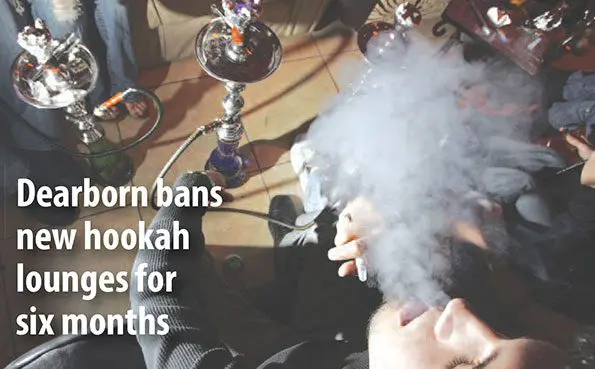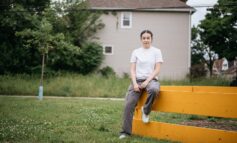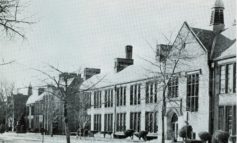
DEARBORN – Following an intense debate, the city council passed a six month moratorium this week banning any new smoking facilities from opening, in an attempt to put a cap on the influx of hookah lounges that have been operating illegally and dominating the business districts.
The Arab American News first reported last month that the city was looking to take active measures against businesses that have disregarded the state’s smoke free air law and have been serving food and hookah under one roof due to loopholes in the system.
In a 5-2 vote, the council approved a 180 day ban against new smoking establishments opening up in the city while it looks into ways to regulate and monitor hookah lounges. Council President Susan Dabaja and Councilman Mike Sareini voted against the resolution.
Sareini in particular strongly opposed the moratorium, asking the city to look more closely into the legalities of the situation.
“This ban I believe is unreasonable and in conflict with state and federal laws,” Sareini said. “The main issue here is that food establishments are not complying with the state law, which is regulated by the health department.”
Councilman David Bazzy argued for the ban, stating that there should be a balance of a variety of businesses in the city in order to aim for a family friendly environment. He compared hookah lounges to bars and adult establishments, which are regulated and licensed through the city.
“We need to sit back and take a long look, establish an ordinance that makes sense and works best for the community,” Bazzy stated. “If we don’t, we will wake up one day and say how did this happen? How did we end up with a one sided business establishment that’s serving no one in the community.”
Mayor Jack O’Reilly said businesses have been able to work around loopholes ever since the state established a smoke free air law in 2010 that restricted businesses from serving food and tobacco under one roof. Some businesses in Dearborn had complied with the laws and segregated their food establishments from the hookah areas by adding a separate section in their establishments.
The state did make exemptions to some businesses at the time, allowing them to serve hookah and food under strict guidelines. The state no longer gives out exemptions and the only possibility of obtaining one would be to purchase an already exempted business from the existing owner. There are currently 15 exempt businesses in Dearborn, but the city estimates an additional 15 are operating illegally. Statewide, there are more than 300 exemptions, but those also include cigar stores.
Many lounges continued to open up in Dearborn, claiming that hookah was classified as “herbs.” These lounges also served food. Both the state and the Wayne County Health Department had previously told the city that they don’t have enough money and manpower to monitor the situation.
O’Reilly added that he is also concerned about the continued underage smoking that allegedly has been taken place at some hookah lounges.
“They aren’t regulated because they don’t have tobacco,” O’Reilly said. “A 12-year-old child can come in and smoke ‘herbs’ and that’s what we are concerned about. It continues to go under the radar because the state doesn’t regulate it. We need to understand the nature and we need to come up with a plan.”
Residents at the city council meeting appeared divided about the situation. Local resident Hussein Dabaja told the council he was against the ban because it affects him directly, as he had planned to open up a hookah establishment in the city in upcoming months.
“You can study the way something works and as you are studying it, people can still continue to operate their businesses, open up new businesses and apply for new businesses,” Dabaja argued to the council.
Resident Hassan Abdallah said the city could take an economic hit if the council were to pass the proposal.
“Voting in favor of this proposal would be risking business investments and interfere with the free market,” Abdallah said.
The city council also heard arguments about the health effects of hookah smoking. Jackie Zeidan, an employee for Dearborn Public Schools, told the council that hookah smoking has weighed down the performance skills of local high school students.
“We don’t need more hookah lounges,” Zeidan said. “This is a very passionate fight for me under the perspective that I sit and deal with kids who are late to school, who are tired and can’t even study because we as parents cannot find the energy to control these hookah lounges. I get that people have a right to have their businesses, but this has got to stop. It is affecting us and I don’t want to wake up 10 years from now wondering what the heck did we do in this community.”
Angela Minicuci, a Michigan Department of Community Health representative, told The Arab American News that the state does not plan on doing any studies or research in regards to hookah consumption and accessibility. However, she added that the state is aware of restaurants that violate the smoke free air law because it receives constant complaints.
“Inspections are done on a local level, and they are done to food establishments,” Minicuci said. “That’s when we will notice if there are smoking violations. We also track and receive complaints regarding the smoke free air law.”






Leave a Reply